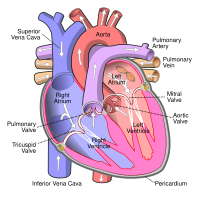
Photo from wikipedia
BackgroundThe role of 1,25-dihydroxyvitamin D3 (vitamin D) in the apoptosis of diabetic cardiomyopathy (DCM) is unclear. This study is to investigate the effects of vitamin D on the pathological changes… Click to show full abstract
BackgroundThe role of 1,25-dihydroxyvitamin D3 (vitamin D) in the apoptosis of diabetic cardiomyopathy (DCM) is unclear. This study is to investigate the effects of vitamin D on the pathological changes in rats with DCM.MethodsRats were randomly divided into the control, model, and treatment groups. DCM model was established by the high-fat and -sugar diet. Plasma glucose, body weight, heart weight, heart weight index, and serum levels of lactate dehydrogenase (LDH) and creatine kinase (CK) were determined. Heart tissue morphology was detected with histochemical staining. Expression levels of Fas and FasL were detected with RT-PCR and immunohistochemistry.ResultsCompared with the control group, the body weights and heart weights were significantly declined, while the plasma glucose levels and heart weight indexes were significantly elevated, in the model group (P < 0.05). However, vitamin D significantly reversed the pathological changes in DCM rats (P < 0.05). Moreover, the serum levels of LDH and CK were significantly increased in the models, which were significantly decreased by vitamin D (P < 0.05). HE staining showed that, vitamin D significantly alleviated the histological changes of myocardial cells in DCM rats. In addition, the mRNA and protein expression levels of Fas and FasL were significantly elevated in the models (P < 0.05), which were significantly declined by vitamin D (P < 0.05).ConclusionVitamin D could alleviate pathological changes, reduce Fas/FasL expression, and attenuate myocardial cell apoptosis in DCM rats, which might be used as a potential effective therapy for the disease.
Journal Title: Lipids in Health and Disease
Year Published: 2017
Link to full text (if available)
Share on Social Media: Sign Up to like & get
recommendations!